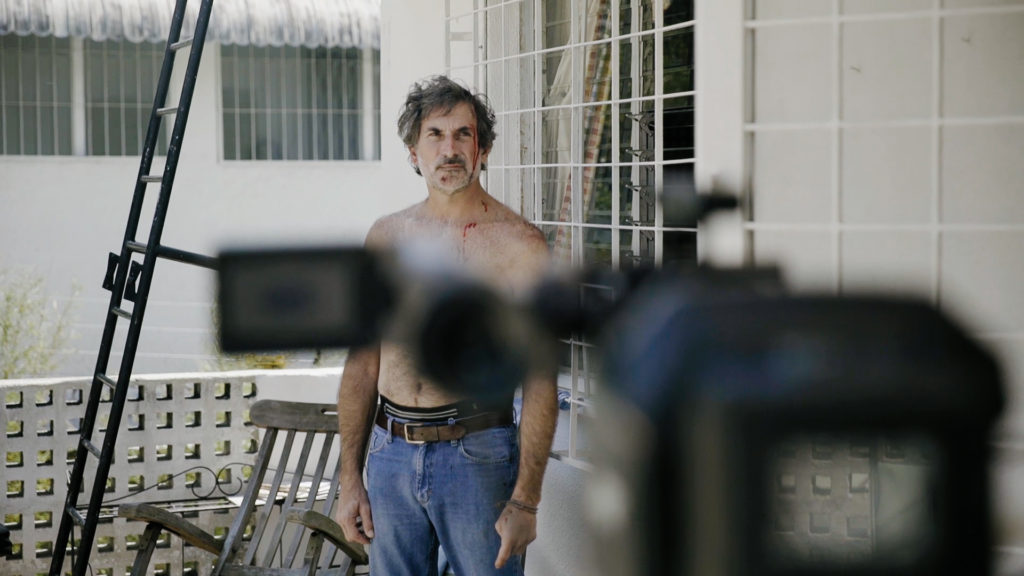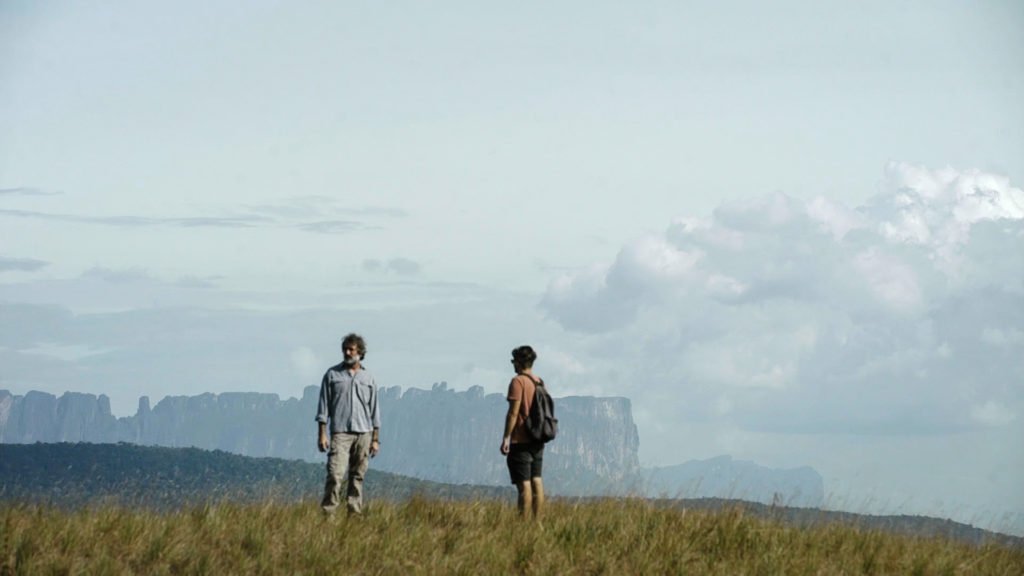Review: El Father Plays Himself (2020)

Let us start with the description of the framing. Mo Scarpelli’s third feature-length documentary, El Father Plays Himself, that premiered at this year’s edition of Visions du Reel (taking place online) in competition, was shot on the set of another film. The mentioned film, La Fortaleza, directed by Jorge Thielen Armand, premiered earlier this year at Rotterdam and is an example of a biography (or even autobiography) fiction about the director’s father and the part of life he spent away from his family working in an illegal gold mine in the Venezuelan Amazonia. Armand’s father Jorge Thielen Hedderich (or Roque, as he goes by) was cast by his son to play the role of himself according to his vision. The trouble is about to ensue…
On the surface, El Father Plays Himself appears to be a film about a troubled shooting of a film, which is not exactly a novel concept. But, unlike Eleanor Coppola’s Hearts of Darknes: A Filmmaker’s Apocalypse that dealt with the shooting of Francis Ford Coppola’s Apocalypse Now and Keith Fulton and Louis Pepe’s Lost in La Mancha, that was about Terry Gilliam’s The Man Who Killed Don Quixote (at that time still an unfinished, “cursed” film), La Fortaleza itself is and will remain a piece of an obscure little arthouse film that might or might not travel the festivals and enter the distribution. That fact might hamper the El Father’s selling chances, or at least narrow down the documentary’s target audience.
Speaking of which, some more insight about the project of La Fortaleza and Armand’s filmmaking career prior to that from Scarpelli’s side would be helpful for the viewers who have not yet seen the film. On the other hand, it is not THAT necessary, since El Father Plays Himself deals primarily with other things like (broken) family ties and the (futile) attempts at mending them, the question of authorship and the authority in storytelling and the presence and the absence in one another’s life from the perspective of the father and the son.
To say that Roque is quite a character would be an understatement. This man in his 50s or 60s might be charming to the strangers, especially with his issues with the sheer notion of authority, but he is also an alcoholic, prone to angry outbursts, the impulses to take over the control and the stubborn defiance. Armand is, on the other hand, milder in the terms of the character, and still has to deal with the fact that he has spent (more than) the half of his life away from his father, since he emigrated to Canada when he was fifteen years old. This combination of combination of factors might be a bit too much for both of the men and for the film on which they are working on and the question arises whose film (and whose story) it actually is.

The documentary is, however, Scarpelli’s from the beginning till the end. Her approach as a filmmaker and as a cinematographer is sometimes voyeuristic, especially when it comes to the confrontations between the father and the son, but it is not exactly exploitative. She is a keen observer, from close up and from afar, as the situation demands it, and she and her crew do not intervene. Some amateur footage, tastefully picked from Armand’s personal archive, some shots that ended up in La Fortaleza and some hat-tips to Werner Herzog (almost mandatory when it comes to shooting in Amazonia) are effectively breaking the gloomy cycle of the poisonous family dynamics that are dominating the screen over the course of the film.
Judged by her career, Mo Scarpelli has a knack for people, both ordinary and extraordinary in extremely extraordinary circumstances, whether they are war photographers in post-Taliban Afghanistan, as it was the case with her feature debut Frame by Frame (2015, co-directed with Alexandra Bombach), or it is a boy that finds himself in the heart of the gentrification in Addis Ababa, which was the case with Ambesa (2019). The question with El Father Plays Himself here is how much the setting, definitely unusual and quite unique, as it the shooting of a small film in the circle of family and close colleagues, works with its fabric of broken family relations, hopes, fears and regrets for the audience that does not belong to that circle. The answer is “shaky at best”.
Original title: El Father Plays Himself
Year: 2020
Runtime: 105′
Countries: Venezuela, Italy, UK, USA
Language: Spanish
Directed by: Mo Scarpelli
Cinematography by: Mo Scarpelli
Editing by: Juan David Soto Taborda
Sound design by: Roberta Ainstein
Colourist: Joel Sahuleka
Produced by: Manon Ardisson, Rodrigo Michelangeli
Executive producers: Gordon Culley, Justin Madhany, Edward Power-Sharif, Bart van den Broek
Production companies: Ardimages, Rake Films, La Faena, Channel 6 Media, TRES Cinematografia
















